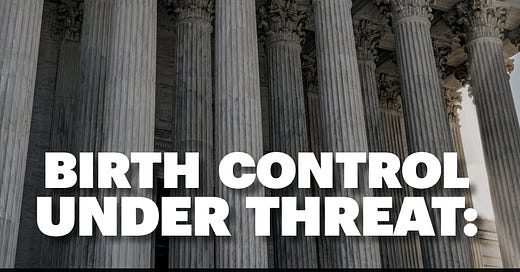New analysis shows challenges and opposition to birth control access
The National Women’s Law Center conducted a historical study of the things that have happened since the Dobbs decision that threaten contraceptive availability.
A new report from the National Women’s Law Center (NWLC) exposes the growing threats to birth control rights and access in the aftermath of the Supreme Court’s decision to overturn Roe v. Wade.
Birth Control Under Threat: How Birth Control Rights and Access Are Being Undermined Since Roe v. Wade Was Overturned shows how contraception has increasingly become a target of anti-reproductive rights efforts, following a strategy similar to those used against abortion. Kimi Chernoby, Mara Gandal-Powers, and Gretchen Borchelt wrote this issue brief.
Chernoby, senior counsel for reproductive rights and health at the NWLC, said birth control was a fundamental right and a critical part of reproductive health care.
“Yet, just as we’ve seen with abortion, extremist politicians and organizations are working to undermine access to contraception, often in ways that fly under the radar,” Chernoby said.”This report is a wake-up call: we must act now to protect birth control before it’s too late.”
The report included details about alarming incidents that happened after Dobbs. One was at the University of Idaho in September 2022, when it issued a memo saying that—to ensure it did not run afoul of various state laws in the wake of the Dobbs decision—the university would not provide standard birth control or information about birth control.
St. Luke’s hospital system in Missouri said it would stop providing emergency contraception, worried that it would run afoul of the Missouri abortion ban.
Nurses who work with sexual assault survivors wrote the Mississippi attorney general to ask whether emergency contraception is considered an abortion under the state’s abortion ban. They did not receive a response.
That has continued this year. A bill banning abortion that was introduced in South Carolina in February 2025 included a medically inaccurate definition of “contraceptives.”
It amended the definition of “contraception” in existing South Carolina law, leading to significant confusion about whether the proposed abortion ban would also criminalize certain forms of birth control.
Politicians also acted in troublesome ways. A nominee for Michigan attorney general, Matt DePerno, likened emergency contraception to fentanyl, a frequently abused opioid medication, and said emergency contraception should be stopped at the state border and banned from the state.
The report also included aspects of how social media has complicated conversations around birth control. False claims about birth control are increasingly being pushed in popular culture and social media. Across social media platforms, a false narrative is emerging that birth control is harmful to your health and that people should pursue “natural” birth control. The claims about harm are unfounded and false,55 but they are convincing people to avoid using birth control.
Nearly one-third of Gen Z-ers receive medical information from social media, with TikTok being the preferred platform for medical advice.
“It is crystal clear that reproductive health opponents want to eliminate both the right to contraception and the people’s ability to access birth control that they need and want,” the report said.




